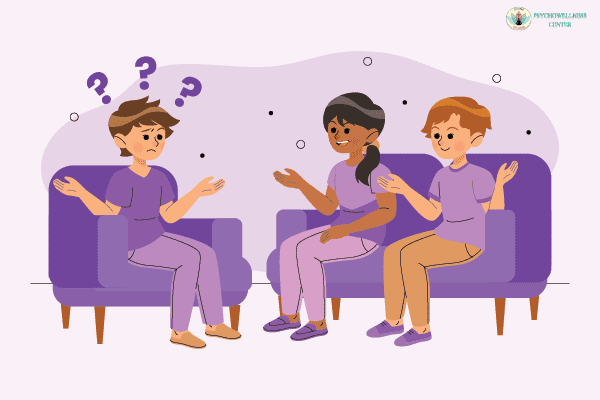Ways to Restore Power Balance in Relationship

Power imbalances in relationships are common, yet when left unaddressed, they can lead to resentment, frustration, Anxiety, Stress, and disconnection. When both partners feel heard, respected, and equally valued, the relationship is considered to be balanced. When one partner holds more influence or control, it can disrupt harmony and create an unhealthy dynamic. Restoring power balance in a relationship isn’t about competing for control, it's about creating a partnership where each person’s thoughts, needs, and desires are acknowledged and valued. Here, we explore key strategies to help restore equality in relationships and promote stronger connections.
Recognizing Power Imbalances in Relationships
A power imbalance often means that one person has more decision-making power or control over shared resources or that one person’s needs are consistently prioritized over the other’s. This can stem from different areas, such as financial control, emotional dependency, Work stress, or imbalanced workloads in maintaining the relationship.
Psychologist John Gottman suggests that healthy relationships should be based on mutual respect and shared influence, with both partners working as a team (Gottman & Silver, 2015). Recognizing when one partner has more influence over decisions or emotions allows both individuals to work together to achieve balance.
Open Communication
One of the most effective ways to restore balance is by promoting open, honest communication. Discuss feelings, concerns, and desires with your partner without blaming or criticizing. Expressing your feelings openly helps each partner understand the impact of their actions, creating a path toward mutual respect.
Establish Shared Decision-Making
In a balanced relationship, both partners should have a say in important decisions, whether they’re related to finances, family, or future goals. To restore balance, commit to discussing and deciding together on matters that affect both of you. This can involve everything from deciding on vacation plans to financial choices.
If one partner tends to dominate decisions, it might be helpful to take turns or actively involve the quieter partner by asking for their input, even on minor decisions.
Identify and Acknowledge Each Other’s Strengths
In any partnership, each person brings their unique strengths to the table. Identifying and acknowledging these strengths can empower each partner and create a more balanced relationship. For instance, if one partner is more financially savvy and the other excels in emotional support, both can take responsibility in these areas while respecting the contributions of the other.
By celebrating each other’s strengths, you build a relationship based on mutual respect. This makes it easier to share responsibilities and reduces the chances of one partner feeling undervalued or overlooked.
Divide Responsibilities Equally
Power imbalances often arise when one partner feels overburdened by responsibilities, whether they’re related to work, household chores, or emotional labour. Discussing and dividing responsibilities more equally is key to restoring balance. Make a list of tasks and responsibilities, and divide them according to both partners’ availability, preferences, and strengths.
For example, if one partner typically handles household chores, it may be beneficial for the other to take on specific tasks to share the load. It’s important to recognize that “equal” doesn’t always mean “the same” instead, aim for a fair distribution based on both partners’ skills and schedules.
Practice Active Listening
Active listening is a powerful way to restore balance in relationships. This involves listening attentively to your partner without interrupting, judging, or formulating your response while they’re speaking. Active listening builds empathy and increases self-esteem showing your partner that their thoughts and feelings are valued.
According to psychologist Carl Rogers, active listening creates a safe space for both individuals to express their needs and emotions, making it easier to reach understanding and compromise (Rogers, 2008).
Express Appreciation and Acknowledge Efforts
Feeling appreciated is essential for both partners in a relationship. When only one partner’s contributions are acknowledged, it can create feelings of resentment and an imbalance in the relationship. Regularly expressing gratitude for each other’s efforts whether it’s for big contributions or small acts of kindness helps both partners feel valued.
For example, a simple “Thank you for taking care of dinner tonight” or “I appreciate your support” can go a long way in building mutual respect. These small gestures encourage an equal exchange of appreciation, creating a balanced emotional environment.
Set Personal Boundaries
Boundaries are critical for maintaining individual identity and independence in a relationship. A lack of boundaries can lead to one partner feeling overpowered or dependent and create burnout. By setting personal boundaries, you can prevent the feeling of being “lost” in the relationship and maintain a sense of self.
Healthy boundaries might involve setting limits on alone time, and personal goals, or managing how each partner handles social connections outside the relationship. Boundaries create space for both partners to grow individually, which strengthens the relationship as a whole.
Seek Support through Counseling
If power imbalances persist despite attempts to restore balance, it may be helpful to seek the support of a licensed therapist or counsellor. Couples counselling can offer guidance on building a healthier dynamic, improve communication, and provide tools to foster respect and equality.
TalktoAngel, an online counselling platform, offers access to professional therapists who specialize in relationship counselling. Through therapy, partners can identify areas of imbalance, understand the underlying reasons for control dynamics, and find strategies for re-establishing harmony. Counselling sessions can provide valuable insights and help both partners feel heard and understood, making it easier to work toward a balanced, mutually supportive relationship.
Commit to Continuous Improvement
Restoring power balance is not a one-time task; it’s an ongoing process that requires attention and commitment. Regularly check in with each other to assess how you both feel about the relationship dynamic and make adjustments as needed. This commitment to improvement shows mutual respect and an understanding that relationships evolve.
As both partners continue to grow and face new challenges, maintaining balance requires open communication, adaptability, and a willingness to prioritize the relationship’s health.
Conclusion
Contribution:- Find mental health support with Dr. (Prof) R K Suri clinical psychologist and Ms Sakshi Dhankar. Expert Counselling psychologist offering clinical and counselling services near you.
References
- Gottman, J., & Silver, N. (2015). The Seven Principles for Making Marriage Work. Harmony Books.
- Rogers, C. R. (2008). On Becoming a Person: A Therapist's View of Psychotherapy. Houghton Mifflin Harcourt.




SHARE